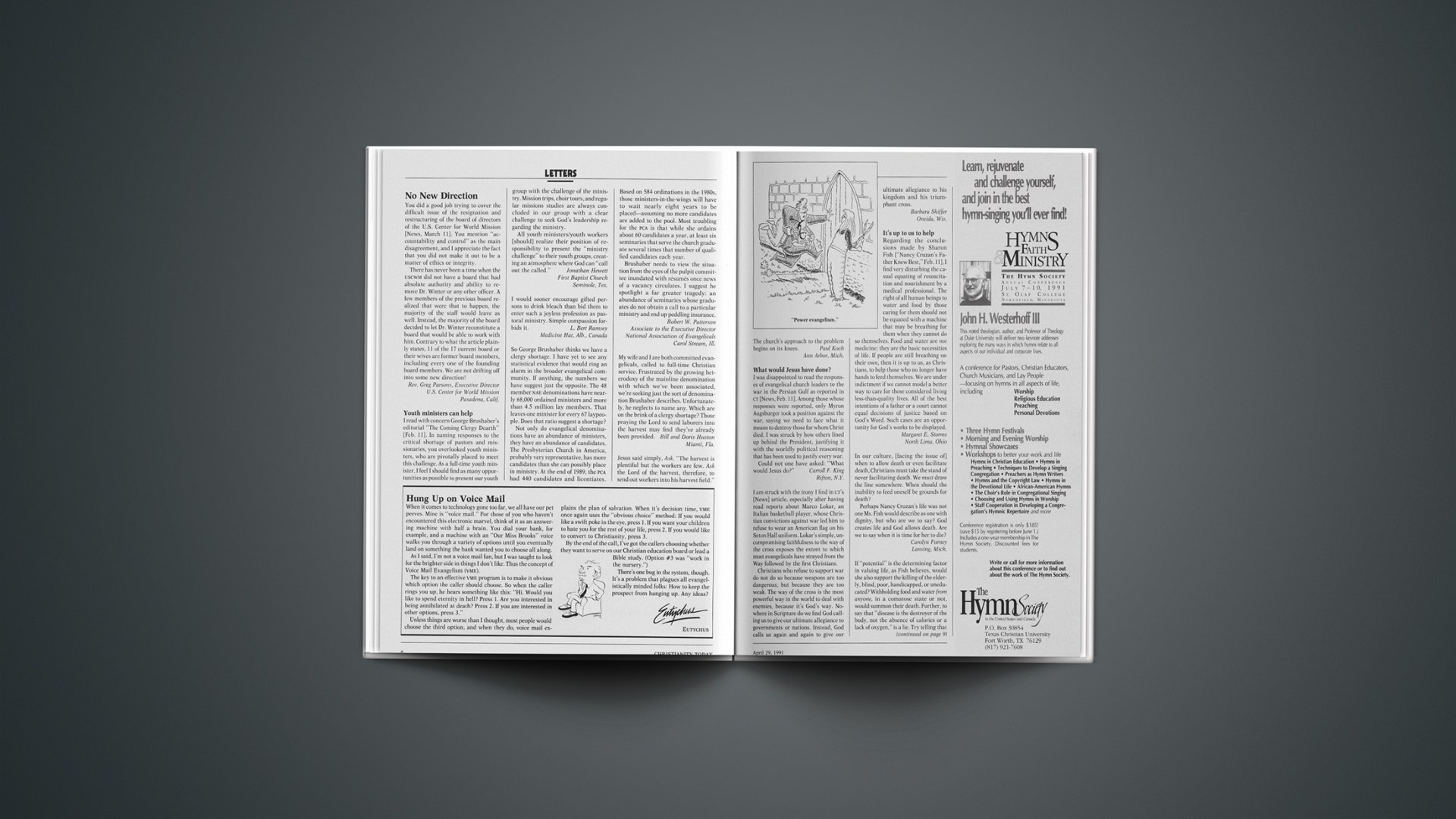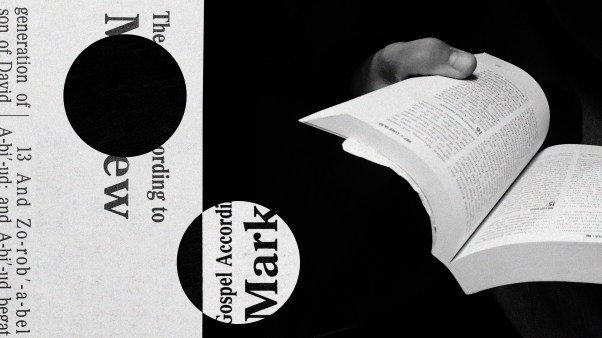When it comes to technology gone too far, we all have our pet peeves. Mine is “voice mail.” For those of you who haven’t encountered this electronic marvel, think of it as an answering machine with half a brain. You dial your bank, for example, and a machine with an “Our Miss Brooks” voice walks you through a variety of options until you eventually land on something the bank wanted you to choose all along.
As I said, I’m not a voice mail fan, but I was taught to look for the brighter side in things I don’t like. Thus the concept of Voice Mail Evangelism (VME).
The key to an effective VME program is to make it obvious which option the caller should choose. So when the caller rings you up, he hears something like this: “Hi. Would you like to spend eternity in hell? Press 1. Are you interested in being annihilated at death? Press 2. If you are interested in other options, press 3.”
Unless things are worse than I thought, most people would choose the third option, and when they do, voice mail explains the plan of salvation. When it’s decision time, VME once again uses the “obvious choice” method: If you would like a swift poke in the eye, press 1. If you want your children to hate you for the rest of your life, press 2. If you would like to convert to Christianity, press 3.
By the end of the call, I’ve got the callers choosing whether they want to serve on our Christian education board or lead a Bible study. (Option #3 was “work in the nursery.”)
There’s one bug in the system, though. It’s a problem that plagues all evangelistically minded folks: How to keep the prospect from hanging up. Any ideas?
Times do change. The collapse of the Berlin Wall and the near demise of communism should settle that. But often, change does not occur with such volcanic suddenness. Recently I saw evidence of the slower sort of change, and it brought deep gratitude to my heart.
I was one of three examiners of a doctoral candidate in one of the oldest, most respected graduate schools of my denomination. The young scholar had requested that I serve as the “outsider” among those who would test him. Since I, for theological and other reasons, had never quite been a part of the “establishment,” it was an honor and thrill.
For some of my friends, a tense Super Bowl decided by an act of prowess in its closing seconds would have pumped far more adrenaline. But the prospect of this defense quickened my pulse.
The subject of the dissertation was the concept of “person” in the Trinitarian thought of the Christian church. There was special reference to Richard of Saint-Victor, the twelfth-century theologian whose untranslated Latin treatise may be the most significant work on the matter since Augustine.
The subject was of special interest to me. It has been ever since I learned the origin of our words person, personhood, and personality. It had been a moment of special pleasure when I discovered that these terms, most precious for us in defining human dignity, were the by-product of the early Christian efforts to explain who Jesus was. It seemed appropriate that we should learn best who we are as we come to know who he is. And, as one who lives in a world where education, business, government, and even the church seem to be depersonalizing us, I wanted to know what my young friend had learned.
It was better than a sports contest to watch two senior scholars put my young friend through his paces. They probed and bored and challenged. They searched for some source or bit of data that had been overlooked, for some implication missed or misinterpreted. And he, with the credential so necessary for his life work hanging in the balance, soberly and carefully responded.
Then they turned to the significance of his work. Insights drawn from divine revelation and scholarly study of that revelation, understandings developed across 20 centuries were explored. But the greatest beauty of that moment was the obvious, but humble commitment of the young man to historic orthodoxy. The acute sense of the holy had not been lost as he probed the mysteries of the nature of the Holy One. Scholarship can, in fact, be worship.
As I left the university campus to return home, a flood of thoughts swept me. One was the memory of the day when the segment of the kingdom to which I belong had no such bright and highly trained and credentialed young people to explicate the mysteries of God. In fact, the door to studies that would furnish that excellence was closed to “fundamentalists.” Old-style “modernists” reigned in those circles.
The poignant memory came back of a moment when I, too, had scholarly ambitions. I was applying to the university of my own denomination in my home conference. I wanted to take one graduate course in Plato. The graduate dean was afraid I might complete the course successfully and then want to pursue a graduate degree there. He openly assured me they did not want to give their degrees to persons with my background and orthodox beliefs.
Times have changed. The Berlin Wall is not the only wall to have come down. Liberal pronouncements may seem as shrill as ever. But their dominance of the center is over.
This does not mean it is time for evangelicals to crow. No, it is time for us to do just what my young friend is doing: explore the mysteries of biblical faith, find its message for our moment, and proclaim it with all the clarity and power God gives us.
One thing should encourage us. The graveyard of history has many stones to mark the passing of various ideologies. One marker, though, is missing. There is no gravestone for historic biblical faith. It lives and will continue to do so, for its word is eternal.










